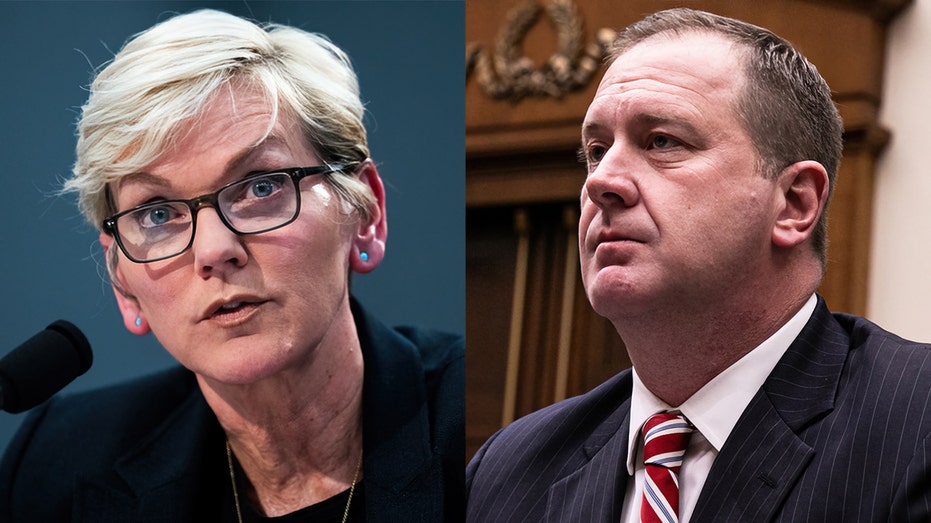Biden’s energy secretary makes 'important admission' over US money flow to China after pressed by GOP senator
Sen. Eric Schmitt says Granholm's 'obsession with climate alarmism' is national security risk
Energy Sec. Jennifer Granholm: ‘Not a dollar’ has gone to China
During Wednesday’s Senate Committee on Armed Services hearing, Sen. Eric Schmitt, R-Mo., pressed Granholm over U.S. funds to Chinese companies and selling petroleum reserves to China.
After pressing President Biden’s energy secretary over economic connections with China and pushing her to admit it's a country "of concern" during a Senate hearing Wednesday, Sen. Eric Schmitt, R-Mo., said Republicans plan to "hold her feet to the fire" over cutting ties with the communist nation.
"You look at all of the money that's going to be flowing from Washington, D.C., on this sort of semi-Green New Deal that they passed last year, we have to have that kind of oversight, make sure we're not aiding and abetting our adversary like China," Schmitt told Fox News Digital after the hearing. "And so I think that was an important admission from today."
Energy Secretary Jennifer Granholm was left stumbling over Schmitt’s questioning on the Biden administration selling oil from the Strategic Petroleum Reserve to China, her past praise of the Chinese Communist Party (CCP) and the green energy push potentially funding Chinese operations.
"I want to ask you about Microvast, which is a lithium battery company that operates primarily out of the People's Republic of China. Your agency granted $200 million worth of a grant to this company. You're aware of this, correct?" Schmitt said during the Senate Committee on Armed Services hearing.
"There were awards, there were selections that were named. And all of those companies were going through a vetting process to ensure that there's no money flowing to countries of concern," Granholm responded. "And so those vetting processes are going on. Not a dollar has gone out the door yet."

Sen. Eric Schmitt, R-Mo., right, on Wednesday pressed Energy Secretary Jennifer Granholm over policies potentially fueling the Chinese Communist Party. (Getty Images)
Schmitt then asked Granholm to clarify whether she’s actually willing to make the commitment that "no dollars will go to any company, any energy company taking advantage of either tax credits or grants that are owned by China, by a Chinese company."
"No state-owned enterprise will get funding from the bipartisan effort," the secretary confirmed.
The grant Schmitt referenced in Wednesday’s hearing is "just one piece" to the China puzzle, he explained while warning that Granholm’s "obsession with climate alarmism" creates a national security risk.
Biden admin has showed 'complete abdication of responsibilities': Sen. Eric Schmitt
Sen. Eric Schmitt, R-Mo., details the 'chaos' and 'crisis' along the southern border that is 'destroying' American communities.
"We're going to be begging countries like Venezuela and Saudi Arabia for oil, shipping strategic petroleum reserves to China is a national security issue. And it also makes them way more expensive for families across the country," the senator said.
Expanding on the China threat, he added that "they're building a nuclear arsenal. They've weaponized islands in the South China Sea. It's a real lack of priorities from this administration, specifically the Department of Energy."
Republicans intend to follow up with Granholm to learn more about the so-called "vetting process" companies go through before receiving government funding, according to Schmitt.
"I think we have to be laser-like focused on this radical agenda that's coming out of the Biden administration, push back and be energy dominant again. That has to be our goal."
"What are they looking at? What should they be looking at? This is serious business, right? Obviously, the department that she controls or is the head of deals with really sensitive information, and funding companies that have ties to communist China in the environment we're in right now is just a nonstarter," the senator explained.
Granholm also stated in her testimony that the Biden White House wants energy to be made in America — but Schmitt stressed that's not consistent with their policy.
GET FOX BUSINESS ON THE GO BY CLICKING HERE
Kevin O'Leary: Energy is the essential aspect of prosperity
O'Leary Ventures Chairman Kevin O'Leary gives his take on the EPA's push for electric vehicles while shutting down energy production on 'Kudlow.'
"They're essentially shipping jobs overseas, they're transitioning to technologies that are found in China, rare earth materials that they blocked here, they go get out in China, we have all the oil and natural gas that we'll ever need right under our feet in the United States of America," Schmitt explained.
"Bringing those jobs home, bringing those supply chains home, making sure we're tapping American energy, having robust exploration is really important," he continued. "We should not be shifting this focus to China."























